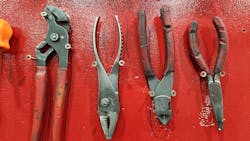Support your techs with the right tools for the job
What are commercial vehicle fleet and independent repair shops concerned with in 2023? Each list will vary on the operation, region, and vehicles serviced, but finding and keeping technicians will be at the top of them all.
The U.S. Bureau of Labor Statistics estimates the overall need for diesel and automotive technicians will grow by 28,100 until 2030. That knowledge has been out for a while, and the industry doesn’t seem close to solving the problem. Tim Spurlock, CEO and co-founder of American Diesel Training Centers, noted that in February 2022, there were a record 55,000 diesel mechanic openings and 30,000 heavy-equipment technician openings.
“I think the true number is well over 100,000 because not every company lists all of their openings on Indeed or job boards,” Spurlock said last June. “This is triple the number of openings on Indeed three to four years ago.”
As of March 21, 2023, Indeed.com listed 43,876 diesel mechanic and 29,029 heavy-equipment technician openings. This is by no means scientific proof, but shows the demand for technicians, and thus the leverage they have in choosing a workplace.
According to Mark Wilson, co-founder and CEO of WrenchWay, “it’s not an employer’s market right now. And for technicians, that may never be again, unfortunately. Hopefully, we get there, but technicians have the power.”
But shop managers, lament not, as you still have plenty of agency. A shop can certainly get good workers in the door by paying a competitive wage, offering clear advancement pathways, and providing strong mentorship. But even those won’t keep a technician in your bay if it’s not stocked with the right tools for the job.
Read more: The tools and equipment of winning operations
You’d want the surgeon operating on you to have the best medical instruments or the chef cooking your meal to have premium utensils, and you should accept no less for the tools used to maintain the assets your company either owns or was entrusted with.
For starters, great tools make your technicians feel you value and have confidence in them. You can’t put a dollar value on that. But if you calculate how much it takes to onboard new techs and train them, you’ll get a good idea.
Your bottom line will also benefit from the minutes cut per job. An innovation that helps remove bolts twice as fast, such as the Ingersoll Rand 1121 Max Impact Ratchet twin-hammer design, adds up to hours over time. This tool is also easier on the tech’s arm, which can succumb to wear and tear just like a truck’s brakes or suspension.
Don’t take our word for it. We had a longtime master diagnostic tech test it out for a month and his only complaint was that his co-workers kept swiping it to help improve their productivity—and billable hours.
Sure, techs typically buy their own tools, but in this environment, providing more common-use tools, or giving techs a tool allowance (tied to parameters such as staying with the shop X number of years) might be a sound investment, and improve morale, efficiency, and productivity.
No investment is 100% guaranteed to pay off, but you can start small with a controlled experiment that is scientific: Measure the KPIs, first with an older tool, then repeat with the new tool. Compare the results and figure out if if the move made or cost you money. Or, even simpler, just talk to your techs and ask what they need. It’s better to ask current workers what they want versus interviewing potential hires. That will end up saving you time, too, which is something you can’t put a price on.
About the Author

John Hitch
Editor-in-chief, Fleet Maintenance
John Hitch is the award-winning editor-in-chief of Fleet Maintenance, where his mission is to provide maintenance leaders and technicians with the the latest information on tools, strategies, and best practices to keep their fleets' commercial vehicles moving.
He is based out of Cleveland, Ohio, and has worked in the B2B journalism space for more than a decade. Hitch was previously senior editor for FleetOwner and before that was technology editor for IndustryWeek and and managing editor of New Equipment Digest.
Hitch graduated from Kent State University and was editor of the student magazine The Burr in 2009.
The former sonar technician served honorably aboard the fast-attack submarine USS Oklahoma City (SSN-723), where he participated in counter-drug ops, an under-ice expedition, and other missions he's not allowed to talk about for several more decades.
